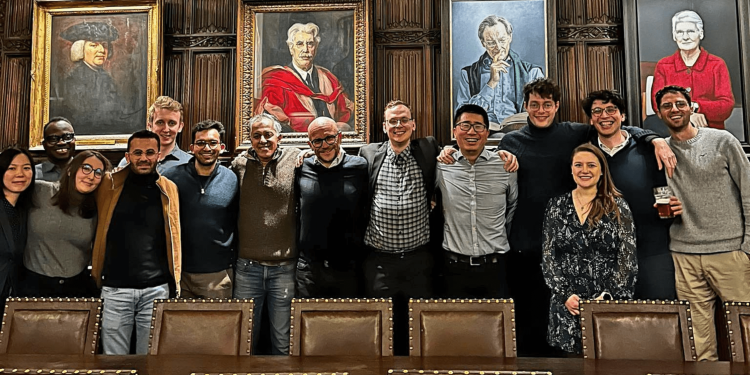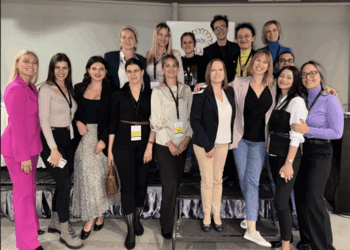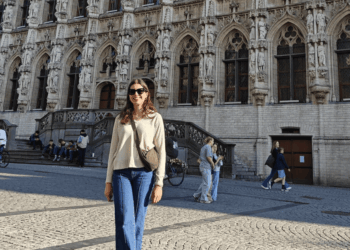Fabio Giuntini is a PhD student at VHIO in Spain who received an EACR Travel Fellowship to visit and work at the University of Cambridge in the UK between September and December 2024.
The EACR, with support from Worldwide Cancer Research, provides Travel Fellowships of up to €3,500 to enable early-career cancer researchers to gain new skills through a short-term visit to a lab or research group in another country.
You can read about other Travel Fellows and their experiences here.
 Name: Fabio Giuntini
Name: Fabio Giuntini
Job title: PhD student
Home institute: VHIO, Spain
Host institute: University of Cambridge, UK
Dates of visit: 30 September – 20 December 2024
Other organisations that funded your trip: VHIO – BBVA/CAIMI bursary
Research: Our research explores a new way to fight cancer using the body’s own immune system. While our immune system naturally fights off viruses and other threats, scientists can now modify specific immune cells called T-cells to target cancer cells. This approach has worked well for blood cancers but is less effective against solid tumours, which are harder to reach. In our study, we created a new type of modified T-cell that carries a powerful anti-cancer drug. When tested on melanoma (a type of skin cancer), this combination not only slowed tumour growth but even made some tumours disappear completely.
Why did you choose to apply for an EACR Travel Fellowship?
Roychoudhuri Group is a cutting-edge lab within the Department of Pathology at the University of Cambridge. I first learned about them because my best friend from Bachelor works in this lab, and we came up together with a very interesting idea to merge our PhD projects. This, that started as a cool idea from two friends, is now a very cool project which is going well. This is why I chose to go visit and learn some of the techniques they do in Cambridge that I would not be able to do here in Barcelona.
What were you able to do that you could not have achieved in your home lab?
Roychoudhuri Lab works with murine T cells. They have cutting edge melanoma models with OT1-OVA T cells. At my home institution we do not have this mouse model, and therefore all the manufacturing of the newly designed T cells has always been performed in Cambridge. With my visit I had the possibility to see the whole process, from T cells isolation to their infection with plasmids and test their cytotoxic power, both in vitro and
in vivo.

Did you take part in any interesting local or cultural activities?
Yes! Cambridge student life is highly interactive and stimulating. Some of my colleagues invited me to go to a couple of College Formals, to be able to try the real Cambridge student experience. These suppers are really magical, and I had the chance to meet so many other remarkable students, even outside my field of studies. I have also managed to try punting on the river Cam, which was a very funny… I have also managed not to fall.
What was a personal highlight of your trip?
Being able to work and learn for three months from my best friend is definitely the highlight of this experience. It was so nice to enter his world and join his inspiring laboratory environment. Moreover, I had the luck of living in Great Shelford, in a beautiful cottage, since the place was available on the University website for exactly the 3 months I needed. I then found out that the owner was a postdoc who also got an EACR Travel Grant to go to New York for a 3-months placement. How serendipitous is life?
Does your lab plan to do any future collaboration or publication with the host lab?
Yes! I think my stay has helped the two labs to generate an incredible collaborative environment and our effort within this placement will eventually generate a shared publication in a scientific journal. Also, I will give a presentation to my home lab about the research I have performed in Cambridge in a lab meeting format. Most importantly, we will keep in touch with the host lab with monthly or bimonthly videocall to secure a smooth continuation of the project from both sides.
How has this visit been beneficial to your research and your career?
Being at the University of Cambridge environment for these 3 months was such a privilege. I was able to live, breathe and learn in one of the best institutions in the world and I could feel it while I was there. I believe that this placement, apart from teaching me new techniques and research methods, will help me to highlight my CV and will enhance my possibilities of obtaining a brilliant postdoc position.
Want to find out more?
If you are interested in applying for the Travel Fellowship scheme, please click here for more information: EACR Travel Fellowships.








